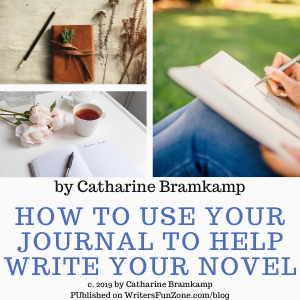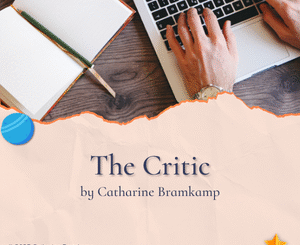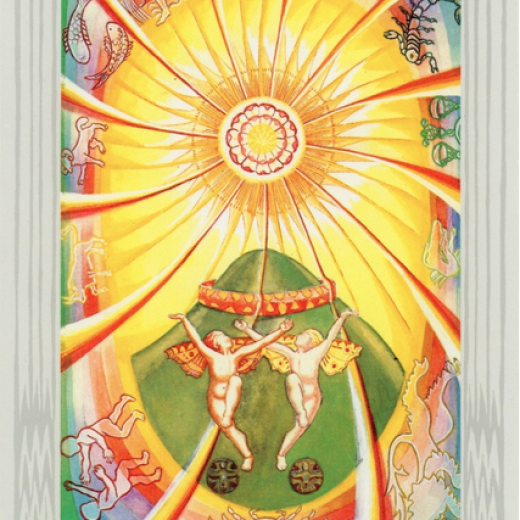How to Use Your Journal to Help Write Your Novel by Catharine Bramkamp
 Let’s welcome back monthly columnist Catharine Bramkamp as she shares with us: “How to Use Your Journal to Help Write Your Novel.” Enjoy!
Let’s welcome back monthly columnist Catharine Bramkamp as she shares with us: “How to Use Your Journal to Help Write Your Novel.” Enjoy!
***
Most writers journal because when it comes to writing, we are all in. We work on our novels while waiting for the traffic light to change. We scribble poems on the back of Costco receipts. We keep journals handy by our beds. We know how journaling can help us change our own minds and move to a better, more conscious life.
What else can journaling do?
Journaling is a great aid in facilitating the creative process.
Journaling helps generate new ideas.
Fun fact: writing a novel it not easy.
Journal to Help Your Write Your Novel
If you find you are stuck for ideas, scenes or just don’t know what to do next in the story, take a break and journal madly, furiously, purposefully, for ten minutes. Do this every day for about a week.
As you journal about whatever comes to mind, possible novel scenes, dialogue, characters will flare up and either just as quickly disintegrate into ash or actually catch fire.
After a couple of days, if the idea is still attractive with glowing energy, insert it into your novel to start a wildfire of action.
Journal to help you stop wasting time thinking
We can think a subject to death. We can think so hard on a subject or a difficult section of our novel in progress that we believe we actually worked on the scene when in fact, we’ve just been fretting about it for weeks.
Often we’re so exhausted by the subject, we feel we’ve already done the work.
Journal about this angst in general and the problem with the scene or plot or character in particular.
Once you’ve written a few pages on this challenging section, do you detected themes?
Are you writing the same thing over and over?
Take that observation and journal about that for a few days.
From that writing and from that journaling, the improved or even new scene should emerge.
Journal to keep your appointment with inspiration
Journaling first thing in the morning is the great way to attract the Muse. By showing up every morning, by writing whatever comes to mind, you signal the Muse the you are ready to go, you are committed to channeling her inspiration, that you will take her ideas and make them real.
Keep your appointments with the Muse and she will keep hers.
Journaling allows for an emotional dump
You can get all your angst and personal tragedy out onto the journal leaving room for a more coherent creative project.
Once you’ve written sad, sad, stories about you, you, you, you free up emotional space in your head and now have some very raw, possibly interesting emotions to transfer to your novel.
Journal to converse with your character
What does your character really want to say?
Open your journal and write in his or her voice. Journal about her past, her experiences, her ideas, let her talk.
Let the villain talk. What about her past and motivation?
Spend a week writing for ten minutes in your character’s voice and see what and who emerges.
Journal to manage your plot
Stuck with plot challenges? Write the question or the plot twist or the challenge at the top of the journal page, then sleep on it.
The next morning, drink coffee, and keep your appointment with the Muse.
Journal.
What is the answer? What should your heroine do? What will get in her way?
Is there enough conflict in the scene, and if not, what could happen? What else can happen?
Are you challenged by the middle of your novel? Journal about possibilities; what could happen?
What could happen anyway? Can the situation be rejuvenated by introducing a new character, the trickster? What kind of mischief can be inflicted on the other characters?
Set up those questions at the top of the page and write for a solid ten minutes. You will find an answer.
Change up your Journaling environment
If you usually write your novel on a laptop in a local cafe, journal about the novel sitting on your bed with a pen and a legal pad.
If you write long hand in a leather bound book in your Downton Abbey library, journal about your novel scene using a typewriter in a basement lit with a single lightbulb.
If you usually type out your work on your phone, journal using a stick in the sand.
In other words, mix up the whole thing for a different perspective and a different way of writing, either slower or faster, either by hand or by key.
Once you find a different way to express yourself, the expression itself will be different. Set that into your novel.
Journaling can make all the difference. That’s why we are all fans.
Want to know more about journaling? Then check the my course here.
***
ABOUT THE AUTHOR
 Catharine Bramkamp is the co-producer of Newbie Writers Podcast that focuses on newer writers and their concerns. She is a successful writing coach, Chief Storytelling Officer, and author of a dozen books including the Real Estate Diva Mysteries series, and The Future Girls series. She holds two degrees in English and is an adjunct university professor. After fracturing her wrist, she has figured out there is very little she is able to do with one hand tied behind her back.
Catharine Bramkamp is the co-producer of Newbie Writers Podcast that focuses on newer writers and their concerns. She is a successful writing coach, Chief Storytelling Officer, and author of a dozen books including the Real Estate Diva Mysteries series, and The Future Girls series. She holds two degrees in English and is an adjunct university professor. After fracturing her wrist, she has figured out there is very little she is able to do with one hand tied behind her back.






